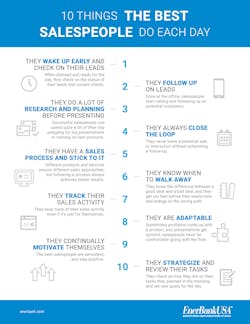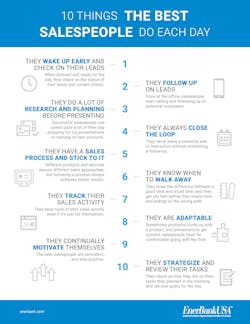10 Things the Best Salespeople Do Each Day
Being an HVACR salesperson is a very stressful job, and needless to say, making sales over the past 18 months has been even more stressful. While the HVACR industry has remained a predominantly in-person or onsite sales process—it’s difficult to bid many projects over Zoom—many sales processes have changed or adjusted to comply with government restrictions related to COVID-19.
This shift has demanded sales professionals be more efficient and effective by establishing a routine. Kendra Cherry notes in Verywell Mind1: “Having a routine can be helpful at any time, particularly if you are trying to establish healthy habits, but these routines can be particularly important when aspects of your life feel uncertain.”
From our research and experience working with salespeople throughout the entire HVACR industry, we’ve created a list of 10 things the best salespeople do every day:
Success Habit #1: Wake up early and check on leads
It’s been said, "Win the morning, win the day."2 One way to win the morning is to check the status of your leads and clients first thing. Reviewing the status of your leads helps set the agenda for the day. It prioritizes who you need to follow up with, making you more productive.
Reviewing your leads daily helps you stay on top of your prospects, leading to more leads that convert to sales.
You can first review any new leads you’ve received, which potential customers need a follow-up email or phone call, which clients are finalizing plans or which customers have installs or repairs that should be completed soon. Reviewing your leads daily helps you stay on top of your prospects, leading to more leads that convert to sales.
Success Habit #2: Follow up on leads
A sales lead response study published in Harvard Business Review3 noted that about 23 percent of companies never responded to leads. That’s leaving a lot of potential revenue on the table from low-hanging fruit.
Leads contacted within 5 minutes are 21 times more likely to be qualified than leads contacted within 30 minutes, and it drops off significantly after that.
That study also outlined the best time to follow up on leads. Research shows the best time to follow up on a lead is within 5 minutes. Leads contacted within 5 minutes are 21 times more likely to be qualified than leads contacted within 30 minutes, and it drops off significantly after that. What’s the average companySuccess Habit #3: Research and plan before presenting
Benjamin Franklin said, “By failing to prepare, you are preparing to fail.” A significant key to a successful sales presentation is not just the product or the delivery but also in the preparation.
The Edward Lowe Foundation4 offers these tips for being ready for a sales presentation:
- Know your product
- Know your competition
- Know the customer
- Know the market
- Anticipate questions and objections
- Prepare visual aids appropriately
Make sure you spend the appropriate time getting ready for a big presentation, whether to a large customer or a complex installation. You’ll close more sales when you do.
Success Habit #4: Always close the loop
According to IRC Sales Solutions5, companies make only 2 percent of sales during the first point of contact; 80 percent of sales are made after the fifth follow-up. In addition, 44 percent of sales professionals give up after just one attempt; only 8 percent make it to the fifth follow-up.
The key to following up successfully is arranging for a follow-up call or meeting before leaving your current contact. That helps set expectations for the customer. It also allows you to see the customer’s timeline for an HVACR purchase decision.
Success Habit #5: Have a sales process and stick to it
According to marketing solution provider HubSpot6 “Effective sales processes boost conversions, turn more potential customers into closed deals, and ensure all of your reps provide customers with positive and consistent experiences—no matter who they're talking to.”
Companies used to talk about customer satisfaction, but today it’s all about customer experience. A sales process makes the customer experience consistent for everyone while increasing conversions and sales.
An effective sales process creates repeatable steps the sales team takes to move a prospect along the funnel. Different products and services may have separate sales approaches, but following a process consistently achieves better results. Certain cooling products may be sold differently than heating, but an energy efficiency pitch would be relevant for both. For example, one best practice that we teach is to offer financing in every step of the sales process. Doing so increases your close rate, along with increasing project size.
Success Habit #6: Know when to walk away from a sale
As part of your sales processes, determine when to walk away. First, you need to learn the difference between a good deal and a bad deal. A lousy deal might cut into your margins too much, or it might take you away from your core business or services. The faster you can learn you’re looking at a bad deal, the better, because you don’t want to waste time and energy on the wrong path.
Paul Petrone7 writes on LinkedIn that you should watch for these signs:
- When you’re not solving, just selling
- When they don’t respond to three consecutive messages
- When it’s in limbo and there’s no clear next step on your end
- When the prospect is making you uncomfortable.
Success Habit #7: Track sales activity
Management guru Peter Drucker once said, “If you can’t measure it, you can’t improve it.” You should measure your sales activity, for yourself, your team or the company.
There are many ways to track your work. You can use the reporting component of a CRM system, which helps automate your sales funnel from warm sales leads to potential projects/repairs/installs to closed deals. You can also track your activities with Excel or Google Sheets spreadsheets. Many productivity software vendors provide ways to track your tasks.
What should you track? Anything from new leads, contacts, deal stages and things like where the lead originated, with an eye for how specific activities move the needle and impact the bottom line.
Success Habit #8: Be adaptable
One of the greatest traits of someone in sales is being adaptable. Inevitably, there will be problems with a product or solution, people will ignore your presentations and follow-up, and a whole host of other challenges may occur.
Elsa Powel Strong and Jeff Becker8 wrote in Training Industry that adaptability is about being a good problem solver. That’s a step further than memorizing products, services and capabilities. Customer needs may be complex. They may not even know what they need. Strong and Becker suggest moving from being polished to being present, from listening to sell to listening to partner, from sales pitch to engaged discussion, and finally from trying to impress to being real.
Success Habit #9: Continually motivate
Motivating yourself and your sales team can sometimes be difficult, especially during hard times.
Michele McGovern at Resourceful Selling9 suggests 15 ways to keep yourself motivated. Here are a few:
- Reward yourself for starting—give yourself something for doing the task that’s most difficult for you.
- Plan an easier win—break down your large goals into small, measurable and attainable steps. Achieving each step counts as a win.
- Dream big—yes, dream big, and visualize yourself achieving that goal. Include visualizing the feelings of achievement too.
Success Habit #10: Strategize and review tasks
In addition to motivating themselves, great HVACR sales professionals strategize and accomplish tasks that lead to the larger goal. Break down your larger goals into achievable tasks and smaller goals. You don’t achieve your commission goal in just one day or one week, but you could break up your commission total into 12, 24 or even 52 parts, focusing on attaining those smaller amounts each week or month. Then, outline how many cold calls, follow-ups and meetings will help you achieve your numbers. Review your tasks each day. Check them off as you finish them.
These 10 habits may be a lot to digest. You don’t need to be exceptional at all of these habits. Maybe you are good at only a few of these. However, like success habit No. 10, pick a trait and focus on improving it. After you’ve conquered it, work on another. As you work on mastering these traits, you’ll become a better HVACR salesperson and see real results.
1 The Importance of Keeping a Routine During Stressful Times (verywellmind.com)
2 Tim Ferriss's Morning Routine | The Muse
3 The Short Life of Online Sales Leads (hbr.org)
4 How to Create and Give a Sales Presentation | Edward Lowe Foundation
5 35 Sales Follow Up Statistics for 2021 [Infographic] — IRC Sales Solutions
6 The Ultimate Guide to Creating a Sales Process (hubspot.com)
7 4 Surefire Signs It’s Time to Walk Away from a Prospect (linkedin.com)
8 Building Your Ideal Sales Team Means Training for Adaptability (trainingindustry.com)
9 15 ways to motivate yourself to sales success - ResourcefulSelling


